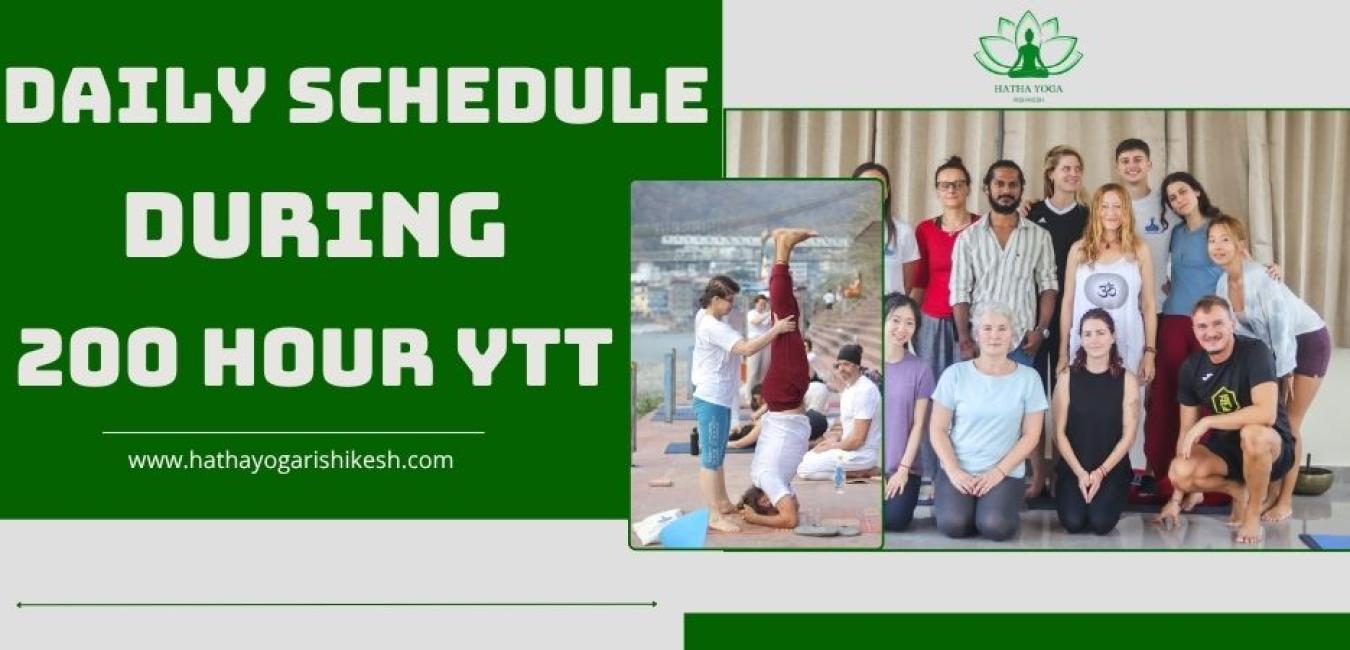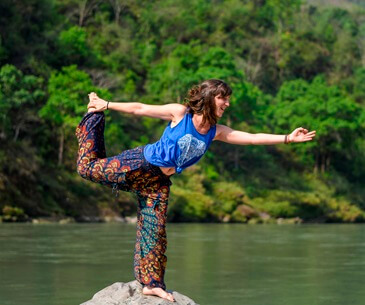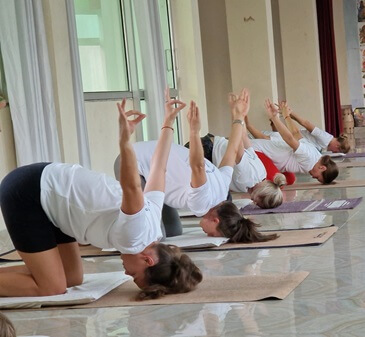
14 May, 2025
Enrolling in a 200-hour Yoga Teacher Training is more than just learning how to teach yoga but it's an experience that changes your life forever and brings harmony to your body, mind, and soul. Hatha Yoga Rishikesh plans every day in a way that allows students to learn ancient yogic practices as well as provides time for personal growth, self-reflection, and building strong connections with others.
Table of Contents
- What is Yoga Teacher Training?
- Daily Schedule at Hatha Yoga Rishikesh
- 5:30 AM – Wake-Up Call
- 6:00 AM – Herbal Tea & Silent Reflection
- 6:15 AM – Yogic Cleansing (Shatkarma)
- 7:00 AM – Pranayama and Mantra Chanting
- 7:30 AM to 9:00 AM – Morning Yoga Asana Class
- 9:00 AM – Satvik Breakfast
- 10:00 AM – Yoga Anatomy
- 11:30 AM – Yoga Philosophy
- 1:00 PM – Lunch & Rest
- 3:00 PM – Teaching Methodology & Alignment
- 4:30 PM – Evening Asana or Teaching Practice
- 5:30 PM – Restorative Yoga & Meditation
- 7:00 PM – Light Dinner
- 8:00 PM – Self-Study and Silence (Mauna)
- 10:00 PM – Lights Off
- Benefits of Following the Daily Schedule During 200-Hour Training
- Discipline and Attendance Policy
- Final Thoughts
Whether you are planning to become a certified yoga instructor or simply deepen your own personal practice, knowledge of the daily schedule for 200-hour yoga teacher training is critical. Let us take you through a typical day during this life-altering course in Rishikesh—world capital of yoga.
What is Yoga Teacher Training?
A Yoga Teacher Training (YTT) is a formal and expansive curriculum that trains prospective yogis in the science and art of teaching yoga. A typical 200-hour YTT is the level most commonly seen, accepted everywhere by organizations such as Yoga Alliance, and is the gateway to professional yoga teaching. The programs pay attention to more than mastering asanas. They teach students deeply:
- Yoga philosophy and history
- Human anatomy and physiology
- Teaching methodology and classroom management
- Pranayama (breathing techniques)
- Meditation and mindfulness practices
- Mantra chanting and spiritual development
- Ethics, discipline, and lifestyle based on yogic values
Although the syllabus is extensive, the actual learning takes place in the form of structure and discipline of the day-to-day routine. Each part of the day is planned with purpose and intent, combining physical practice with intellectual awareness and spiritual realization.
Read Also: Which Asana Works for Increasing Height?
Daily Schedule at Hatha Yoga Rishikesh
At Hatha Yoga Rishikesh, the daily routine is a careful balance of effort and relaxation, activity and rest, learning and contemplation. Here's the detailed schedule of a normal day during your yoga training:-
5:30 AM – Wake-Up Call
The morning starts much earlier than the sunrise, with the gentle background noise of nature and maybe the faint sound of the Ganga's gurgle in the distance. Rising early is a habit of tapas—discipline—and the yogic way of life. It makes for a day spent in awareness, being present, and with purpose.
6:00 AM – Herbal Tea & Silent Reflection
A soothing cup of herbal tea is presented to softly stimulate the senses. This period is usually quiet, inviting inward focus and centering.
6:15 AM – Yogic Cleansing (Shatkarma)
Students are led through shatkarma—traditional yogic cleansing techniques such as jala neti (nasal cleansing) or kapalabhati (cleansing breathwork). These cleanse the body and condition it for extensive pranayama and asana practice.
7:00 AM – Pranayama and Mantra Chanting
Breath is the passage from body to mind. The class comprises formal pranayama exercises like Anulom Vilom, Bhastrika, and Nadi Shodhana. Together with mantra chanting, students begin the day by aligning energy and consciousness.
7:30 AM to 9:00 AM – Morning Yoga Asana Class
The morning's first asana session is physically active and invigorating. It often consists of Hatha Yoga or Vinyasa Flow, which emphasizes:
- Strength and flexibility
- Alignment and breath coordination
- Developing endurance and body awareness
The tranquil yoga shala, infused with the tranquility of Rishikesh, becomes a place of sanctity for inner exploration.
9:00 AM – Satvik Breakfast
Students are treated to a healthy Satvik meal—fresh, plant-based, and rejuvenating—after practice. Standard breakfasts consist of:
- Seasonal fruits
- Herbal teas
- Oatmeal, porridge
- Idli, upma, or other light Indian dishes
The meals are lovingly prepared and prepared according to Ayurveda, nourishing the body and the mind.
10:00 AM – Yoga Anatomy
Students explore anatomy and physiology and learn how the asanas influence the musculoskeletal and breathing systems. The sessions provide for safe and effective instruction, paying close attention to alignment and prevention of injury.
11:30 AM – Yoga Philosophy
Philosophy courses are a glimpse into the ancient knowledge of yoga. Classics such as the Yoga Sutras of Patanjali, Bhagavad Gita, and Hatha Yoga Pradipika are studied. Topics tend to be the eight limbs of yoga, the idea of karma, and the way to self-realization. This mental dive allows students to bridge contemporary practice with eternal yogic wisdom.
1:00 PM – Lunch & Rest
Lunch provides a balanced meal of grains, legumes, vegetables, and Ayurvedic spices and herbs. Post-lunch is relaxation time—students can rest, write in their journals, or do self-study (Svadhyaya). This lunchtime rest is essential to digest the high learning and prepare for the second part of the day.
3:00 PM – Teaching Methodology & Alignment
These hands-on sessions impart the art of teaching yoga. Students learn:
- How to structure class sequences
- Verbal cueing methods
- Hands-on adjustments
- Safe adjustments for different body types
- Ethical behavior as a yoga teacher
Alignment classes emphasize the nuances of every pose, making sure that students not only get it done but can also teach poses properly. Confidence as a potential teacher starts to flower here.
4:30 PM – Evening Asana or Teaching Practice
This hour is spent either on:
- Traditional Yoga Sequences (such as Ashtanga, Hatha Flow, Yin Yoga), or
- Peer Teaching Practice, in which students teach mini classes in groups of a limited number under guidance from senior educators.
Teaching practice is helpful for developing voice, presence, and classroom authority. Positive criticism is given for the improvement in teaching skills.
5:30 PM – Restorative Yoga & Meditation
This last yoga practice is calming, gentle, and extremely restorative. Techniques include:
- Yoga Nidra
- Candle-gazing meditation (Trataka)
- Mindfulness meditation
7:00 PM – Light Dinner
Supper is early and light, encouraging proper digestion and quiet sleep. The peaceful environment nurtures group bonding and open-hearted sharing among trainees.
8:00 PM – Self-Study and Silence (Mauna)
Students utilize this time to:
- Review learning of the day
- Prepare for future teaching practice
- Reflect in silence
Most schools, such as Hatha Yoga Rishikesh, practice Mauna (silence) in the evening to improve inner consciousness and meditative living.
10:00 PM – Lights Off
An early bedtime with a disciplined approach ensures physical recovery and mental calmness. The habit of waking up and sleeping on time improves students' concentration and energy levels during the training.
Benefits of Following the Daily Schedule During 200-Hour Training
Following the disciplined daily routine throughout your 200-hour yoga teacher training has numerous physical, mental, and spiritual advantages. The consistency prepares you for life as a committed yoga teacher.
- Develops Discipline and Routine:- The fixed schedule promotes a disciplined lifestyle. Waking up early, eating on time, regular practice, and proper rest train the body and mind for balance and focus.
- Improves Physical Strength and Flexibility:- Daily asana practice increases stamina, flexibility, and posture. With time, you will observe evident improvement in your strength and endurance.
- Deepens Yogic Knowledge:- Focused time for philosophy, anatomy, and teaching techniques provides you with a strong foundation of yoga and enhances personal development.
- Develops Breath and Energy Control:- Daily pranayama and meditation enhance concentration, clarity, and emotional calm by allowing control over your internal energy systems.
- Supports Mental and Emotional Clarity:- Meditation and self-reflection time encourage inner calm and awareness, reducing anxiety and stress.
- Encourages Healthy Eating and Digestion:- Detox is supported by a sattvic diet, and immunity is enhanced. Digestion and overall well-being are enhanced by light, plant-based meals at regular intervals.
- Strengthens Teaching Skills:- Daily teaching practice and feedback help you gain confidence, improve communication, and learn how to guide a class effectively.
Discipline and Attendance Policy
Discipline is at the core of any authentic yoga journey. At Hatha Yoga Rishikesh:
- Full class attendance is mandatory
- Students must inform faculty in advance for any emergency leave
- Uninformed absence may affect certification eligibility
Changes in schedule due to seasonal adjustments or guest lectures will be communicated ahead of time.
Final Thoughts
The daily schedule during 200-hour yoga teacher training is not just a timetable—it's a way of life. It mirrors the ancient tradition of living in harmony with nature, with self, and with the community. Each day brings a new layer of discovery—be it about anatomy, philosophy, your physical strength, or your emotional patterns.
As you journey through the month, these small, structured routines become the foundation of a deeply personal and spiritual transformation. By the end of the training, you will not only be certified to teach yoga—you’ll also carry within you the discipline, awareness, and compassion of a true yogi.
Also Read: 200-Hour YTT Retreat Packing List in Rishikesh


